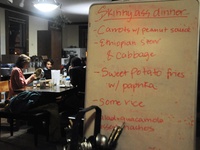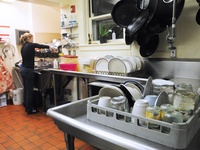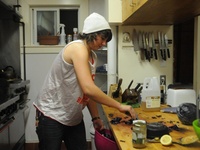WHIPPING UP A MEAL
This particular evening, Goldfeder was in charge of cooking all of the main dishes for dinner. She added three chopped heads of cabbage to the already overflowing giant wok on the stove. Her vegetable stir-fry, along with pasta, tofu, and salad, would feed all 32 residents.
Cooperative living is fundamentally about taking responsibility for your own life, according to Dudley House Master James “Jim” M. Hogle, and cooking meals is a large part of this lifestyle.
When the Co-op was founded in 1958, Radcliffe College and Lesley University students were hired to do most of the cooking, Forbes said. As the community evolved, residents have taken on all of the day-to-day responsibilities, which they said allows college to be more like real life.
“[The Co-op] reminds me of my house. My mom loves to cook,” Goldfeder said. “You have to work to make it your home, but it’s really a home, not a dorm.”
The Co-op is managed through a points system in which students need to fulfill a certain number of credits every two-week cycle, which means cooking dinner can be an optional chore.
“A lot of people in the Co-op eat incredibly well but never cook,” Rojer said.
For those who do cook, meals are an opportunity to channel creativity and inspiration, Rojer added.
“I like to have themes in a meal because it’s a little weird when we have Indian food and pasta in the same meal,” said Goldfeder, who, like many in the Co-op, is a Visual and Environmental Studies concentrator.
She nibbled on a piece of leftover tofu, contemplating whether she would reuse it.
“The theme of this dinner—take all of these old things and make them better, hopefully” she said.
Recipes are rarely followed. While they are useful for inspiration, Goldfeder said, it is impossible to follow a recipe when cooking for 32 people.
“At the Co-op, there’s a lot of public education in cooking,” Rojer said. “You learn little things, like that certain spices taste better toasted.”
For breakfast and lunch, residents have access to the full-scale industrial kitchen to cook their own meals, a perk that drew some of the current residents to the Co-op.
Christopher A. Johnson-Roberson ’11 said he decided to leave his blocking group when they wanted to move out of Dewolfe housing. Making the switch to the Co-op allowed him continued access to a kitchen.
Read more in News
Experts Discuss Drug Cocktail















